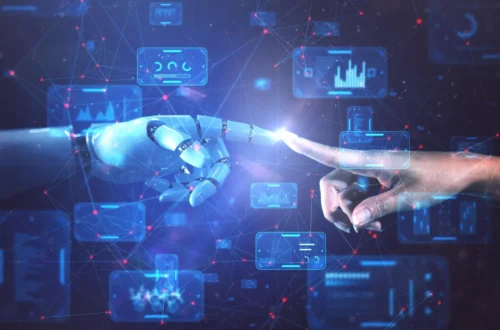Technology has been at the forefront of human progress for centuries, constantly evolving and transforming the way we live, work, and interact with the world. From the invention of the wheel to the rise of the internet, technological advancements have continuously reshaped our lives. Today, we are in the midst of a technological revolution that is more transformative than ever before. From artificial intelligence and blockchain to quantum computing and beyond, the pace of innovation is accelerating, offering both unprecedented opportunities and complex challenges.
In this article, we will explore some of the most exciting technological innovations that are shaping our future, how they impact various industries, and what they mean for our everyday lives.
1. Artificial Intelligence (AI) and Machine Learning (ML)
Artificial Intelligence (AI) has gone from a concept in science fiction to a practical tool in various industries, revolutionizing everything from healthcare and education to finance and entertainment. At its core, AI refers to machines or systems designed to mimic human intelligence, learning from data and experiences to make decisions, solve problems, and improve over time.
-
Machine Learning: A subset of AI, machine learning (ML) involves teaching algorithms to recognize patterns and make predictions based on data. From autonomous vehicles to personalized recommendations on streaming platforms, ML is already deeply integrated into many aspects of our daily lives.
-
AI in Healthcare: AI has the potential to revolutionize healthcare, offering faster and more accurate diagnoses, predicting disease outbreaks, and even creating personalized treatment plans. AI-driven tools like medical imaging software can help doctors identify diseases such as cancer in their early stages, saving lives and improving patient outcomes.
-
AI in Automation: Automation powered by AI and ML is streamlining business operations, reducing costs, and increasing productivity. Whether it’s in manufacturing, customer service, or data entry, intelligent automation is making processes faster, more efficient, and less prone to human error.
The rise of AI promises to enhance human capabilities, but it also raises ethical concerns around job displacement, privacy, and decision-making. As AI continues to evolve, finding the right balance between innovation and responsible use will be crucial.
2. Blockchain Technology
Blockchain, the technology behind cryptocurrencies like Bitcoin, has evolved into a powerful tool with the potential to transform a wide range of industries beyond finance. A blockchain is essentially a decentralized ledger of transactions that is distributed across a network of computers. This ensures that data is transparent, secure, and immutable.
-
Decentralization: One of the key advantages of blockchain is its decentralized nature. Unlike traditional centralized systems, where a single entity controls the data, blockchain allows for peer-to-peer transactions without the need for intermediaries. This can increase trust and reduce the risk of fraud, especially in sectors like banking, supply chain management, and voting systems.
-
Smart Contracts: Blockchain also enables the use of smart contracts—self-executing contracts with the terms of the agreement directly written into code. These contracts automatically execute when predefined conditions are met, ensuring efficiency and reducing the need for intermediaries.
-
Blockchain in Supply Chain: Blockchain can enhance transparency in supply chains by providing real-time tracking of products from the manufacturer to the consumer. This reduces fraud, ensures the authenticity of goods, and enables companies to better manage inventory.
Blockchain technology holds great promise, but its widespread adoption is still hindered by scalability challenges, regulatory uncertainty, and environmental concerns related to energy consumption in cryptocurrency mining.
3. Quantum Computing: The Next Frontier
Quantum computing is a field of technology that has the potential to solve problems that are currently unsolvable by classical computers. Unlike traditional computers, which use bits to process information in binary form (0s and 1s), quantum computers use quantum bits or qubits. These qubits can exist in multiple states simultaneously, allowing quantum computers to perform complex calculations at speeds exponentially faster than today’s supercomputers.
-
Solving Complex Problems: Quantum computing is expected to have a profound impact on fields such as cryptography, medicine, and climate modeling. For example, quantum computers could simulate molecular interactions in drug development, speeding up the discovery of new medicines. They could also crack encryption methods used in cybersecurity, requiring new techniques to ensure data protection.
-
Quantum Machine Learning: The combination of quantum computing and machine learning holds immense potential. Quantum machine learning could dramatically speed up the training of AI models, enabling faster and more efficient decision-making processes in areas like finance, healthcare, and logistics.
While quantum computing holds promise, it’s still in its early stages of development. Significant technical challenges remain before we can build scalable and reliable quantum computers that can outpace traditional systems in real-world applications.
4. 5G Technology: Unlocking the Future of Connectivity
5G, the fifth generation of mobile network technology, is set to revolutionize the way we connect to the internet. Compared to 4G, 5G offers faster speeds, lower latency, and greater capacity, allowing for more devices to be connected at once. This breakthrough technology will have a profound impact on industries ranging from telecommunications to transportation.
-
Enhanced Speed and Reliability: 5G will offer download speeds up to 100 times faster than 4G, enabling quicker data transfer, smoother video streaming, and enhanced gaming experiences. It will also provide more stable and reliable connectivity, even in densely populated areas.
-
IoT and Smart Cities: The ultra-low latency and high capacity of 5G networks will power the growth of the Internet of Things (IoT), enabling devices to communicate with each other in real time. Smart cities, for example, will be able to manage traffic, monitor air quality, and optimize energy usage through connected sensors and devices powered by 5G.
-
Autonomous Vehicles: One of the most exciting applications of 5G is in autonomous vehicles. The faster and more reliable network will allow self-driving cars to communicate with each other and traffic infrastructure in real time, making transportation safer, more efficient, and more sustainable.
As 5G networks are rolled out globally, the next generation of connected devices and services will enable new innovations that we can only begin to imagine today.
5. The Internet of Things (IoT)
The Internet of Things (IoT) refers to the network of physical devices that are connected to the internet and can communicate with each other. From smart homes to connected industrial machinery, IoT is making it possible for devices to share data, automate processes, and improve efficiency.
-
Smart Homes: IoT has made its way into everyday life, with devices like smart thermostats, security cameras, and voice assistants transforming our homes into connected hubs. These devices can be controlled remotely and interact with each other to create personalized, automated experiences.
-
Industrial IoT (IIoT): In industries such as manufacturing, agriculture, and logistics, IoT is being used to monitor machinery, track inventory, and optimize production processes. Sensors embedded in equipment can alert operators to maintenance needs, reducing downtime and improving efficiency.
-
Healthcare IoT: IoT has the potential to revolutionize healthcare by enabling remote patient monitoring, tracking vital signs, and providing personalized care. Wearable devices, for example, can monitor heart rate, blood pressure, and glucose levels, alerting both patients and doctors to potential health risks.
As IoT devices proliferate, the challenges of securing and managing massive amounts of data will become more significant, requiring new solutions to ensure privacy and safety.
6. Augmented Reality (AR) and Virtual Reality (VR)
Augmented Reality (AR) and Virtual Reality (VR) are changing the way we interact with digital content, creating immersive experiences that were once only possible in science fiction.
-
AR in Retail: Augmented reality is transforming the retail industry by allowing customers to visualize products in their own space before making a purchase. Furniture retailers, for example, use AR to let customers see how a piece of furniture will look in their home through their smartphone camera.
-
VR in Education: Virtual reality offers the potential to create immersive learning experiences, allowing students to explore virtual environments and interact with simulations. From virtual field trips to medical training, VR has the ability to enhance education by making abstract concepts more tangible and engaging.
-
AR and VR in Gaming: Gaming is one of the most popular applications of AR and VR. With VR headsets, players can immerse themselves in a completely virtual world, while AR games like Pokémon GO overlay digital content onto the real world, creating interactive experiences.
As the hardware and software for AR and VR continue to improve, these technologies will become more mainstream, offering new ways to interact with digital content and the world around us.
Conclusion
The technological landscape is advancing at a rapid pace, and we are only scratching the surface of what is possible. From AI and blockchain to quantum computing and 5G, the innovations of today are paving the way for a future filled with exciting possibilities. As these technologies evolve, they will continue to shape industries, redefine the way we live, and open up new opportunities for growth and innovation.
However, with these advancements come challenges. Ethical concerns, privacy issues, and the need for regulation will play a critical role in ensuring that these technologies are used responsibly and for the benefit of all. The future of technology is both exciting and complex, and it will require collaboration, innovation, and careful consideration to unlock its full potential.




